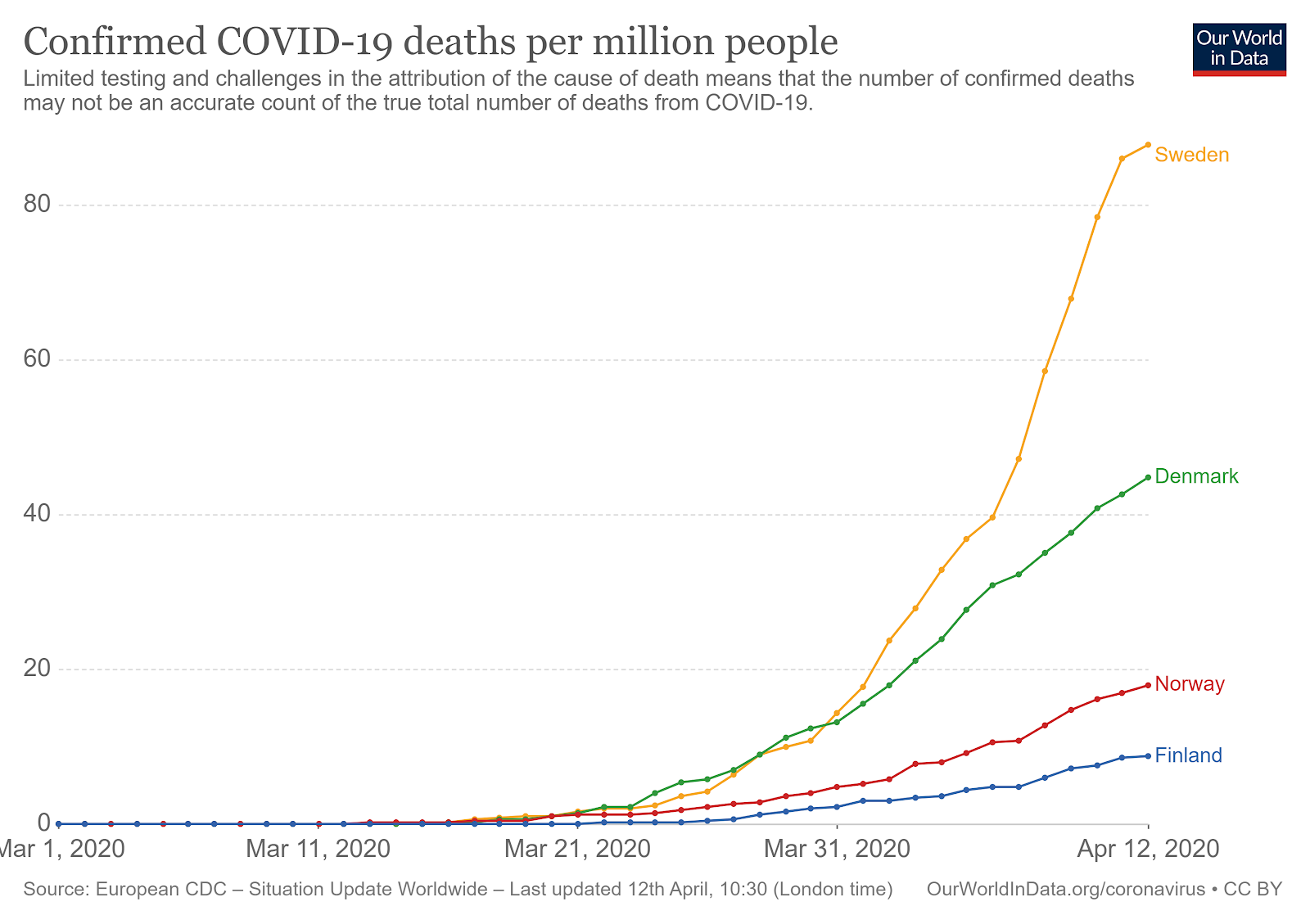Happy Monday. “Then put your little hand in mine, there ain’t no hill or mountain we can’t climb …”
Quick Hits: Today’s Top Stories
-
As of Sunday night, there are now 555,398 confirmed cases of COVID-19 in the United States (a 4.8 percent increase from the day before) and 22,073 deaths (a 7.1 percent increase), according to the Johns Hopkins University COVID-19 Dashboard, leading to a mortality rate among confirmed cases of 4 percent (the true mortality rate is difficult to calculate due to incomplete testing regimens). Of 2,805,892 coronavirus tests conducted in the United States, 19.7 percent have come back positive, per the COVID Tracking Project, a separate dataset with slightly different topline numbers.
-
Apple and Google announced they are teaming up to provide tools for software engineers interested in developing contact-tracing apps that could track the spread of the coronavirus through users’ phones. President Trump said the White House will take a “very strong look” at the plan, but it will undoubtedly face a series of privacy questions.
-
Govs. Larry Hogan of Maryland and Andrew Cuomo of New York called on Congress to appropriate an additional $500 billion for states and territories to address their coronavirus-related budgetary shortfalls.
-
The IRS announced it has begun depositing the congressionally approved relief checks into taxpayers bank accounts.
-
President Trump fired off a series of tweets over the weekend, many attacking the “lamestream media” for its reporting on coronavirus. Trump also retweeted a California congressional candidate’s attacks on Dr. Anthony Fauci, including the hashtag “Time to #FireFauci.”
How Sweet is the Swedish Model?

As the weeks of coronavirus lockdown roll by, the economic damage and the cabin fever of the American people are both only getting worse. As such, it’s no surprise that more people are beginning to cast furtive glances at Sweden, which, as we discussed last week, has pursued by far the least restrictive lockdown strategy among major nations in fighting the coronavirus. Last week, Fox News’ Tucker Carlson—who was not one to minimize the coronavirus threat, at least initially—favorably compared what he described as “the Swedish model of targeted restrictions coupled with voluntary distancing” with “the Chinese model: total lockdowns, internal travel restrictions, punishment for those who step out of line.” Our government, Carlson lamented, had opted to follow the Chinese model.
While no single metric can paint a full picture of how well a nation is doing against coronavirus, the most useful benchmark remains total fatalities relative to population size. By this metric, Sweden is not yet in nearly as bad of shape as are a number of other European countries that are farther along their infection path. Both Spain and Italy, where the virus seemingly spread widely before nationwide lockdown measures went into effect, are still suffering far more concentrated deaths: about five times more than Sweden relative to total population. It isn’t as though they’re just letting the virus run its course: the voluntary distancing the Swedes are largely doing is still ameliorating the effects of the spread.
Yet the drawbacks are plain, too. This is easiest to see when comparing Sweden not to Europe as a whole, but to its fellow Scandinavian nations. Both Norway and Finland are registering infection and death rates many times lower than Sweden’s.
The most striking comparison is with Denmark, which is far more densely populated than Sweden. All else being equal, that fact would put Denmark at a far higher risk of infection disaster than its roomier northern neighbor. But Denmark, which announced a lockdown on March 11 before the country had suffered a single confirmed COVID-19 death, has in reality fared far better than Sweden, as this chart of per capita COVID deaths from Our World In Data shows:

We can see a bit of a case of the narrative lagging behind the data here. If you looked at that chart at the end of March, about three weeks after Sweden and Denmark’s strategies diverged, you could be forgiven for thinking that perhaps it suggested the Danish response was unduly severe. Over the last two weeks, the numbers have begun to look very different.
Nor is Sweden likely to be spared the economic devastation we are currently experiencing in more locked down countries. As several writers have pointed out, Sweden’s own government expects the Swedish economy to contract more dramatically this year than America’s.
It’s important to note that the Swedish rationale for steering clear of heavier measures wasn’t just that they thought more severe lockdowns would be ineffective in slowing the spread. Instead, they have argued that shutting things down more extensively just isn’t sustainable over the months this crisis could last. “It is important to have a policy that can be sustained over a longer period, meaning staying home if you are sick,” Anders Tegnell, the state epidemiologist who has set the course of Sweden’s virus policy, said last week. “Locking people up at home won’t work in the longer term.”
Peter Lindgren, managing director of the Swedish Institute for Health Economics, made a similar argument in a recent interview with Vox: “We may have to do this for a long time, and if you put all the heavy stuff in place at once, it will be quite difficult to maintain that.”
At this stage, of course, it’s impossible to say whether that theory will bear out. It seems undeniable that the longer lockdowns like the United States’ go on, the more people will begin to find them unbearable, the more they’ll begin to cut corners, and the less airtight the social distancing will become. But the needle could move the other way, too: If spiking deaths lead Sweden to change its tune and implement more severe restrictions after all, they’ll be in the same boat as the rest of us, with only extra pain to show for it.
The Coming Collision With Iran
As the Iranian Revolution celebrates the recent anniversary of its 41st year, there are many reasons to believe the pressure its leaders are facing—internally, externally and from a global pandemic—have the regime on edge. While news in the United States is understandably dominated by the coronavirus and its implications for the American economy, there are other issues that cannot be ignored. This is one of them.
On the website, we have the first of a two-part series from Reuel Marc Gerecht, a former CIA operative and longtime Iran expert, that we believe is the definitive look at the Iranian regime and the Trump administration. It’s long—but authoritative and insightful, examining the many factors at play in the current Iran vs. U.S. standoff by assessing the dynamics of the current moment in the context of recent history.
The coronavirus has hit Iran hard. If the regime senses that its deceit and ineptitude in handling the malady could cause civil unrest once people can again safely gather, it’s not unlikely that the regime will strike Americans in the hope of recapturing the ardent emotions vented during the massive funeral processions for Qassem Suleimani, the Islamic Revolutionary Guard commander killed in Baghdad in January by a U.S. drone. Khamenei’s druthers are to go bold. Numerous factors are coming together to superheat the forty-one year-old struggle between the Islamic Republic and the United States over the next eight months. But the most important factor by far is the supreme leader—his unrelenting conspiratorial hatred of the United States, his particular distaste for Trump, and his determination to preserve his impressive accomplishments.
Khamenei is prideful. He has maintained the legacy of the theocracy’s founder, Ruhollah Khomeini, and, despite enormous resistance from his compatriots, kept the revolution from sliding into Thermidor. Khamenei has thwarted every attempt to reform the Islamic fundamentals of the state. He has confronted massive pro-democracy street demonstrations, as large as those that brought down the shah, and overcome them. He has also bent the Iranian senior clergy, which had little respect for him when he became supreme leader in 1989, to his will. He has outmaneuvered his rivals and advanced his men among the ruling ulama, the intelligence service, and the Revolutionary Guards, the theocracy’s praetorians. VIP mullahs and guardsmen hold vast wealth and power and yet haven’t become seditious. A student of European literature, a poet manqué who has tormented and likely killed dissident poets, Khamenei is capable of promoting men of widely differing scruples and religiosity.
The Islamic Republic is more influential today than at any time since 1979. Most of his countrymen may have zero respect for him as a divine, but Khamenei, with the indispensable assistance of Suleimani, successfully oversaw the creation of foreign Shiite militias throughout the Middle East, subjugated the Shiite Iraqi elite and gained de facto control of Shiism’s holiest shrine cities. Khamenei held firm in Syria when it appeared the Allawi government of Bashar al-Assad was going down. A Sunni victory in Syria could have been catastrophic for the clerical regime in Lebanon and Iraq. Adverse repercussions at home could have been substantial. The regime’s resolve enabled Russia’s decisive entry into the conflict in 2015.
And, perhaps above all else, Khamenei humbled the United States. No factor was more important in tormenting Americans in Iraq than the Iranian. Tehran provisioned and sometimes captained a wide array of militant Shiite groups attacking American soldiers. These forces were defeated or beaten into quiescence by George W. Bush’s “surge” from 2006–2008, but deep, lasting damage was done to America’s psyche. Barack Obama’s election in 2008; his calamitous withdrawal from Iraq in 2011; the rampant anti-war and isolationist sentiments on both the American left and right; Donald Trump’s political rise; the bipartisan indifference to Iranian and Russian imperialism that in Syria watched hundreds of thousands of civilians perish, millions put to flight, the foundation of the European Union crack, and right-wing populism rise—all happened in part because of Khamenei’s determination to make America bleed in Iraq. For this achievement alone, the cleric is one of the most consequential rulers in the Middle East since World War II. Only his predecessor may have had a greater global impact.
And yet Khamenei has been discombobulated by Trump. The cleric initially saw something in the New Yorker to inspire hope: his “endless wars” rhetoric suggested that America might really be departing the Middle East, that the retrenchment Obama started might become a full-on retreat. Trump’s revocation of the nuclear agreement, re-imposition of punishing sanctions, and killing of Suleimani—the commander of the Quds Force, the special-forces/terrorist-liaison branch of the Guard Corps, who’d become a son to the supreme leader—dashed Khamenei’s hope that the Great Satan was a spent force.
Worth Your Time
-
ProPublica reports that the White House routed a $96 million no-bid contract to Air Boss of America for “100,000 powered respirators and filters for medical workers treating patients in New York,” a “highly unusual” move for the rewarding of federal contracts. The value of Air Boss stock, which is traded in Canada, has doubled. A statement from the Federal Emergency Management Agency acknowledged the push for the contract came from the White House. “The company’s proposal/offer was submitted by a White House task force assisting with sourcing of needed supplies and equipment.” Pro Publica reports that the government database that recorded the procurement, a contract officer noted that the contract was “ordered by the White House.”
-
The New York Times published a detailed and deeply reported analysis of the Donald Trump’s failure to act earlier on the many coronavirus warnings given to him by his own top advisers. “Throughout January, as Mr. Trump repeatedly played down the seriousness of the virus and focused on other issues, an array of figures inside his government—from top White House advisers to experts deep in the cabinet departments and intelligence agencies—identified the threat, sounded alarms and made clear the need for aggressive action.” National Security Council officials raised the possibility early of keeping Americans home from work and locking down big cities. The president was given a heads-up about a memo from top trade adviser Peter Navarro, warning of the potential of hundreds of thousands of deaths across the country. Health and Human Services Secretary Alex Azar offered dire assessments directly to Trump, warnings that Trump shrugged off as alarmist.
-
When Lauren Austin finished her dissertation two years ago, it felt like so many other dissertations—a deep dive into an obscure subject. But today, the 285-page study about a century-old black swan is directly relevant to our daily lives. Why? Her topic: “Afraid to Breathe: Understanding North Carolina’s Experience of the 1918-1919 Influenza Pandemic at the State, Local, and Individual Levels.” Austin spoke to Tony Mecia of the Charlotte Ledger about what she learned and how the experiences of the 1918 Spanish Flu pandemic apply to what we’re going through today.
-
Sunday afternoon, Andrea Bocelli presented a short, streaming concert live from the Duomo in Milan. At one point, nearly 3 million people were watching it live. There’s a reason. Most certainly worth your time. Watch it here.
Presented Without Comment
Also Presented Without Comment
Also Also Presented Without Comment
Pop Culture Recommendation
If, by any chance, you have a spare hour or two around the house (and we have a feeling you might), the newest Pixar movie, Onward, is now available for free on Disney+ or to rent everywhere else. It’s ostensibly “for kids,” but one of your Morning Dispatchers watched it over the weekend and he cried three times. A beautiful story on adventure, love, and family.
Toeing the Company Line
-
Reason magazine managing editor Stephanie Slade interviewed our own David French back in December for a Q&A published in the new issue of the magazine. It’s a fascinating discussion on nationalism, religious liberty, free speech and, of course, Drag Queen Story Hour.
-
Speaking of David, his Easter French Press is not to be missed. “The loss of life has been amplified by the strain on souls as jobs disappear and businesses collapse. Physical death stalks the land. Spiritual despair wells up in human hearts. Yet the resurrection power persists and will overcome. ‘He is risen!’ Christians proclaim today. And because he rose, we can also declare in faith and hope—so will we.”
-
On the website today, Sarah has a useful explainer regarding the constitutional issues around inspectors general. President Trump removed two IGs, Michael Atkinson and Glenn Fine, from their posts within days of one another. Members of Congress from both parties have expressed concern but as Sarah explains, the the answer to the question,“Can Congress limit the president’s power to remove a member of the executive branch?” is: “Not easily.”
-
Jonah’s latest G-File (in both written and audio formats) is bats**t—you’ll get it once you read it. We guarantee this is the only “news”letter out there featuring characters as wide-ranging as “halfway decent bat anus swabbers,” Alexis de Tocqueville, John Winger from the movie Stripes, Frederick the Great, and Pippa: America’s Most Harmless Dog. Check it out here.
Let Us Know
Trump said at one of his press conferences last week that “without question,” the timing on “reopening” the country is “the biggest decision” he’s ever had to make. Setting aside the fact that it’s not entirely up to him, determining when and how to resume economic activity is indeed a monumental undertaking. But his phrasing got us thinking—what is the biggest decision you’ve ever had to make?
Reporting by Declan Garvey (@declanpgarvey), Andrew Egger (@EggerDC), Alec Dent (@Alec_Dent), Sarah Isgur (@whignewtons), and Steve Hayes (@stephenfhayes).
Photograph of Swedes hanging out at a park in Stockholm by Narciso Contreras/Anadolu Agency via Getty Images)







Please note that we at The Dispatch hold ourselves, our work, and our commenters to a higher standard than other places on the internet. We welcome comments that foster genuine debate or discussion—including comments critical of us or our work—but responses that include ad hominem attacks on fellow Dispatch members or are intended to stoke fear and anger may be moderated.
With your membership, you only have the ability to comment on The Morning Dispatch articles. Consider upgrading to join the conversation everywhere.